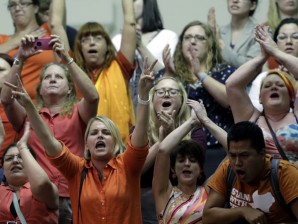Texas Senate passes restrictive abortion bill

Members of the gallery cheer and chant as the Texas Senate tries to bring an abortion bill to a vote as time expires, Wednesday, June 26, 2013, in Austin, Texas. Amid the deafening roar of abortion rights supporters, Texas Republicans huddled around the Senate podium to pass new abortion restrictions, but whether the vote was cast before or after midnight is in dispute. If signed into law, the measures would close almost every abortion clinic in Texas. (AP Photo/Eric Gay)
AUSTIN, Texas—Amid the deafening roar of abortion rights supporters, Texas Republicans huddled around the Senate podium to pass legislation that is expected to close almost every abortion clinic in the second most populous US state.
Hundreds of protesters cheered, clapped and shouted late Tuesday for the last 15 minutes of the special legislative session in an attempt to run out the clock before senators could vote on the abortion restrictions.
While Democrats as well as assembled reporters watched clocks on their mobile phones tick past midnight, Lt. Gov. David Dewhurst said the voting began just before. The bill now goes to Governor Rick Perry, who directed that the legislation be taken up in the special session and is expected to sign it into law.
Democrats immediately predicted a legal challenge. The special session of the legislature was supposed to end at midnight.
“It’s questionable to vote when no one can hear to even know if a vote is taken,” said Senator Kirk Watson, a Democrat.
Article continues after this advertisementOne of the state’s most conservative lawmakers, Houston Republican Senator Dan Patrick, insisted the vote was valid.
Article continues after this advertisement“Had that not happened, everyone would have known what was happening,” he said.
Democratic Senator Wendy Davis spent most of the day staging an old-fashioned filibuster — using a marathon speech to delay a final vote on the legislation. Her effort attracted wide support, including a mention from President Barack Obama’s campaign Twitter account. Her Twitter following went from 1,200 in the morning to more than 20,000 by Tuesday night.
Davis’ mission, however, was cut short.
Rules stipulated she remain standing, not lean on her desk or take any breaks — even for meals or to use the bathroom. But she also was required to stay on topic, and Republicans pointed out a mistake and later protested again when another lawmaker helped her with a back brace.
Republican Senator Donna Campbell called the third point of order because of her remarks about a previous law concerning sonograms. Under the rules, lawmakers can vote to end a filibuster after three sustained points of order.
After much back and forth, the Republicans voted to end the filibuster minutes before midnight, sparking the raucous response from protesters.
If signed into law, the measures would close almost every abortion clinic in Texas, a state 773 miles (1,244 kilometers) wide and 790 miles (1,271 kilometers) long with 26 million people. A woman living along the Mexico border or in West Texas would have to drive hundreds of miles (kilometers) to obtain an abortion if the law passes. The law’s provision that abortions be performed at surgical centers means only five of Texas’ 42 abortion clinics are currently designated to remain in operation.
In her opening remarks, Davis said she was “rising on the floor today to humbly give voice to thousands of Texans” and called Republican efforts to pass the bill a “raw abuse of power.”
Democrats chose Davis, of Fort Worth, to lead the effort because of her background as a woman who had her first child as a teenager and went on to graduate from Harvard Law School.
In the hallway outside the Senate chamber, hundreds of women stood in line, waiting for someone to relinquish a gallery seat. Women’s rights supporters wore orange T-shirts to show their support for Davis.
Twice in the first six hours, anti-abortion lawmakers questioned Davis about the bill, presenting their arguments that it would protect women or that abortions were wrong. Davis answered their questions but did not give up control of the floor.
Davis read testimony from women and doctors who would be impacted by the changes, but who were denied the opportunity to speak in a Republican-controlled committee. During one heart-wrenching story describing a woman’s difficult pregnancy, Davis choked up several times and wiped away tears.
The bill would ban abortion after 20 weeks of pregnancy and force many clinics that perform the procedure to upgrade their facilities and be classified as ambulatory surgical centers. Also, doctors would be required to have admitting privileges at a hospital within 30 miles (50 kilometers) — a tall order in rural communities.
“If this passes, abortion would be virtually banned in the state of Texas, and many women could be forced to resort to dangerous and unsafe measures,” said Cecile Richards, president of Planned Parenthood Action Fund and daughter of the late former Texas governor Ann Richards.